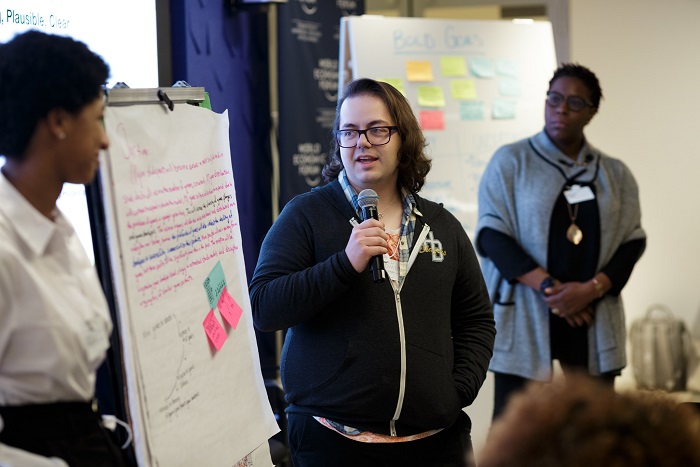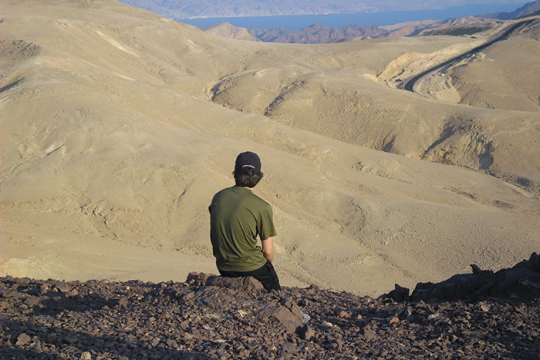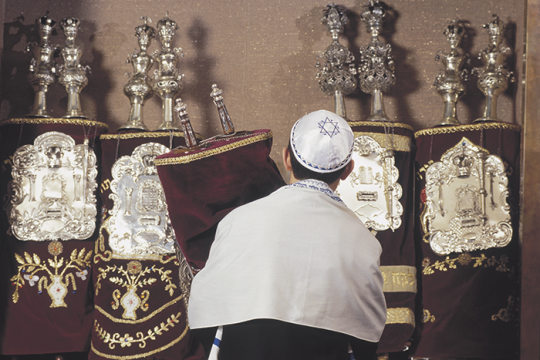
Grace Collins Speaking at the World Bank
Grace Collins (they/them) is the founder and CEO of Snowbright Studio and Liminal Esports. They previously led game-based education policy at the US Department of Education and managed educational technology projects at the Smithsonian Institution. A former computer science teacher and a published author and game developer, Grace has been recognized with several awards, including being named a finalist for the 2020 Digital Education Breakthrough of the Year Award. Grace is an alum of the URJ's JewV'Nation Fellowship LGBTQ+ cohort. I sat down with Grace to talk about gender and Judaism.
When did you first become aware that the world does not have to been seen through a binary gender lens?
That’s a hard question for a trans person. The gender boundaries that exist in our society are so ingrained and so ever-present that it's hard to pinpoint the specific moment when you become aware of them. From a very early age, you're split into boys and girls, you’re told go to a particular bathroom, dress a certain way, and watch shows that reinforce heterosexual gender normative relationships.
For most of my young childhood, I struggled to understand those rules and boundaries. Why did I have to go play with other boys in certain ways versus being allowed to choose? It didn’t make a lot of sense to me.
A turning point came in my last year of high school, when I had the good fortune to go out to Stanford University for a summer program. The program was amazing and transformative, of course, but one of the memories that stays with me is their all-gender bathroom where, for the first time ,I didn't feel that sense of panic that public restrooms evoked.
It would be another 15 years before I could admit to myself that I really needed to re-examine my own concept of gender identity
What term do you use to identify your gender today?
I prefer the term “non-binary,” which simply means that if you're going to try and put me into either a man or woman bucket, I'm not playing that game. Those categories do not apply to me.
Can gender labels sometimes be more confusing than clarifying?
There's an inherent limitation anytime you try to pin down identity into some sort of ontology. For example, it's great that more people understand what non-binary means, but when someone says, “Okay, all the non-binary people go over here,” instead of a binary, we have a trinary. The point of saying “non-binary” is to free folks to identify and represent themselves as they would like, and it can change over time. Plenty of people who identify as gender fluid may change day by day from non-binary to identifying as a man or a woman.
As part of your life’s journey, you found the path to Judaism. How did that come about?
Raised in the Catholic church in rural Ohio, I had no concept of what being Jewish was and neither did the people around me. When I did ask about Judaism in comparative religion classes, I was told it was Christianity 1.0. This way of thinking was wrong on many levels.
I recognized that Christianity was not for me and decided that my life would be better without religion at all. Then one day, I was googling around and read an article on ReformJudaism.org about the life of rabbis and about how you can't be a Jew alone; how you have to be a part of community. I thought, “Wait a minute, that doesn’t sound anything like the Judaism that had been explained to me. So then I started doing more research on a bunch of different websites and came upon an introduction to Judaism course (A Taste of Judaism) But before signing up, I checked out the suggested reading list and found a title that purportedly would answer the question I wanted answered: "What Do Jews Believe?" By David Ariel. I was certain that I’d find something that would rub me the wrong way but found myself in full agreement with everything in the book!
One day, I decided to just show up at synagogue down the street from us in Woodbridge, Virginia. Thankfully, Congregation Ner Shalom was very welcoming, and it's just been a whirlwind since. I now belong to Suburban Temple - Kol Ami, near Cleveland, where I teach youth how to tell their own stories through games and interactive media.
Are your partner and children Jewish?
Our children are Jewish. My partner’s story is for her to tell. She has been very supportive of me throughout and is very active at our temple’s community. She volunteers there more than I do and serves on a number of committees.
You joined the URJ’s JewV’Nation Fellowship program in 2019. What was that like for you?
Seeing the diverse representations of Judaism and sharing experiences with other LGBTQ+ Jews helped me recognize that other people are having experiences that are similar to mine, such as struggling with the binary, gendered language of Hebrew rituals. What differentiated me the most was coming to Judaism later in life and not having any idea what people were talking about when they referred to things like Ashkenazi food traditions or the latest news in Israel, which were topics that had not often been on my radar. I’ve found that it can be helpful for others in the Jewish community when I share my experiences about coming to Judaism later in life, since so many have not had that experience.
What gives you hope for the future?
Young people. I saw a student get up on a stage in front of 400 people at my former school and say to the entire school, “Hey, y'all have known that I've been a lesbian for awhile. I wanted to come out today as non-binary.” The entire auditorium erupted in applause. I thought about the challenges that I had gone through as a teen and how much progress has been made in a short amount of time. Many young people are not willing to wait for older generations to fix problems anymore, and so they are fixing the world themselves. That gives me hope.
Related Posts

Funny, You Don’t Look...

Spicing up my Hispanic Heritage and Embracing Sephardic Traditions


